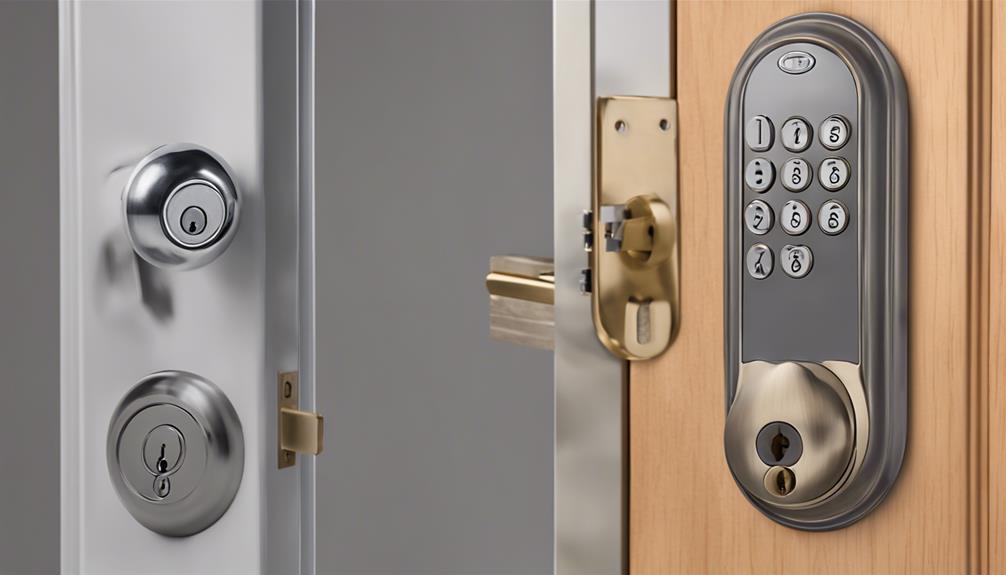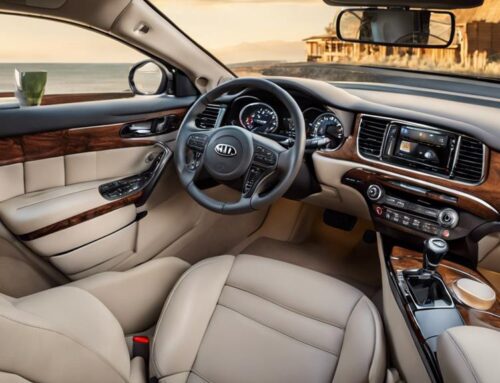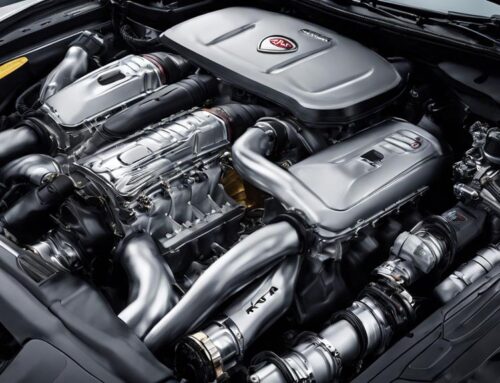When securing your home, opt for the right lock to boost security and peace of mind. Consider smart locks with features like fingerprint sensors and remote access for added convenience. Deadbolts offer strong resistance against forced entry, while knob locks suit interior doors best. Look into lock grades – Grade 1 for high security needs – and compatibility with your door type. Verify the heavy-duty strike plate enhances your deadbolt's security. Remember to factor in backset measurements, cross bore size, door thickness, and lock handing. These essential considerations can help you make an informed choice for your home's safety.
Key Takeaways
- Consider security grades like Grade 1 for high-security needs.
- Evaluate lock compatibility with door type and material.
- Choose deadbolts for exterior doors, knob locks for interior.
- Look for smart lock features like remote access and keyless entry.
- Enhance security with heavy-duty strike plates and high-quality locks.
Latest Door Lock Technologies
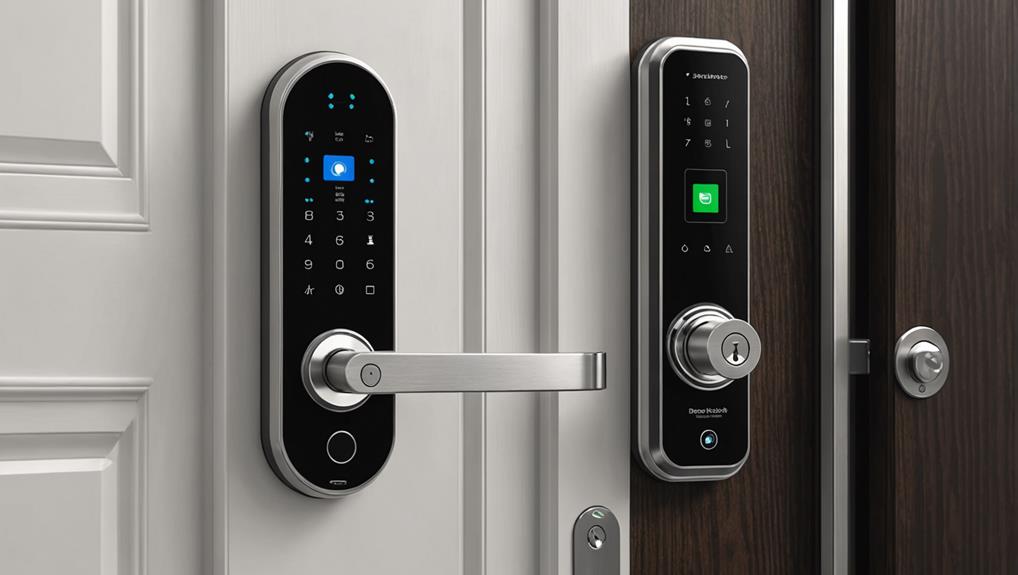
When considering the latest door lock technologies for your home, you'll be pleased to discover the advancements that have revolutionized the way we secure our spaces.
Smart locks, especially the innovative WiFi Smart Lock systems, now directly connect to your home network, eliminating the need for extra hubs and providing unmatched convenience and connectivity. With the integration of fingerprint sensors, keyless entry has become a reality, enhancing both security and convenience for you and your loved ones.
Many of the top smart locks also offer remote access features, allowing you to control and monitor your locks from anywhere via smartphone apps.
Retrofit smart locks offer a user-friendly solution for upgrading your existing deadbolts, ensuring a seamless changeover to modern security features while still retaining traditional key access.
The incorporation of Thread technology in smart locks enables low-power wireless networking, facilitating direct internet connectivity without the requirement of intermediary devices.
Moreover, the latest door lock technologies focus on enhanced designs that blend aesthetics and discreetness, catering to your preferences for home security solutions that complement your living space seamlessly.
These advancements in door security promise not only peace of mind but also a stylish and efficient way to safeguard your home.
Types of Door Locks
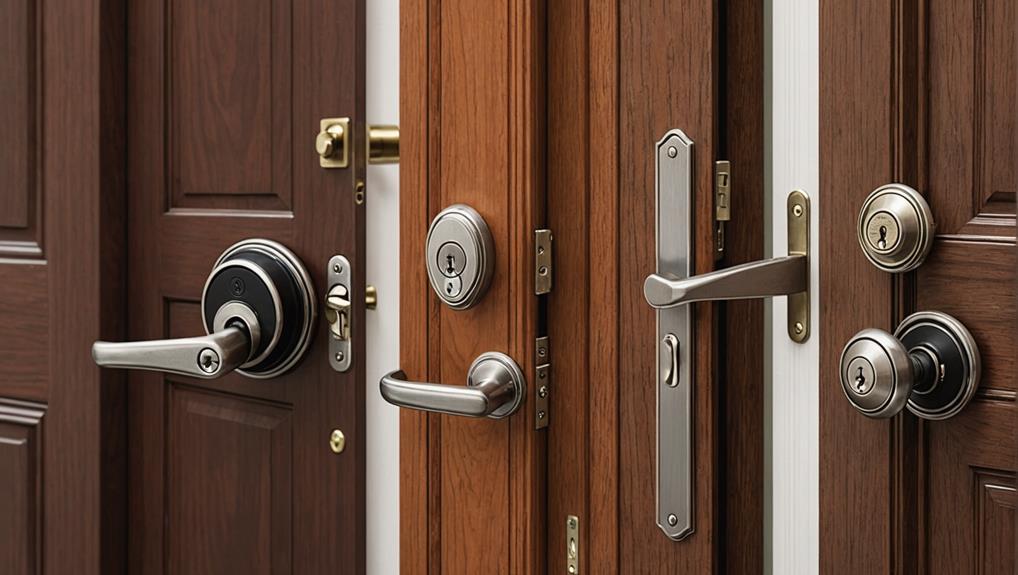
If you're looking to enhance the security of your home, understanding the various types of door locks available can help you make an informed decision.
Smart locks offer keyless entry and remote monitoring through smartphone apps, integrating well with smart home systems.
Deadbolt locks provide strong resistance to forced entry and come in different styles like single-cylinder and double-cylinder. For more robust protection, consider the most secure and reliable lock recommended by experts.
Knob locks, commonly used for interior doors, aren't recommended for exterior use due to their vulnerability. They're often paired with deadbolts for added security.
Electronic locks with keypads offer a modern solution for residential and commercial properties, combining convenience with security.
Combination locks, requiring access codes, are ideal for scenarios where multiple users need entry without physical keys.
Understanding these options can help you choose the right lock to keep your home secure.
Security Testing and Performance
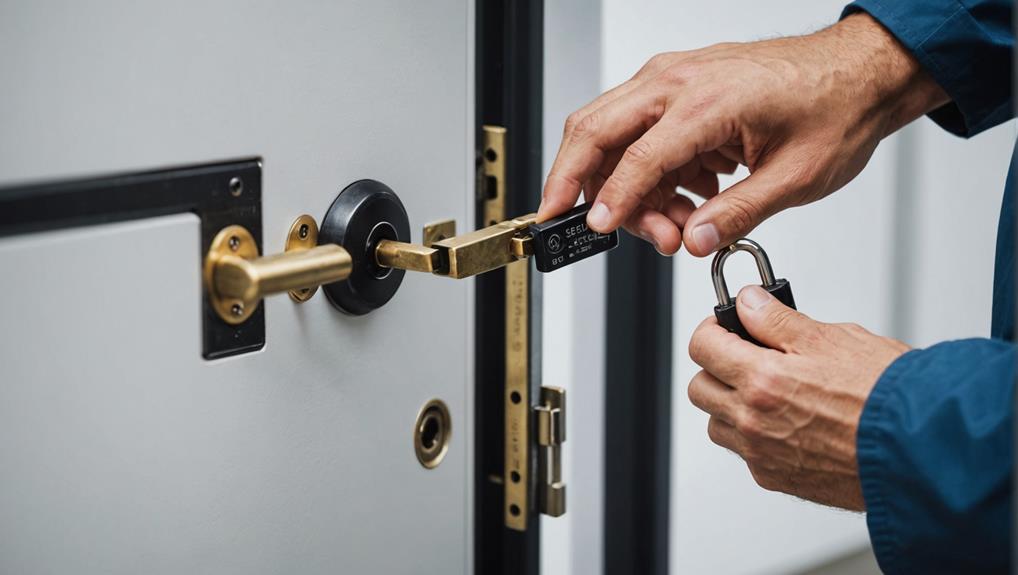
To assess the security of door locks effectively, Consumer Reports conducts rigorous testing that subjects them to various real-world scenarios. This includes kick-in, drilling, and picking tests using specialized equipment like a 100-pound battering ram. Many standard locks can be compromised easily, emphasizing the significance of choosing high-quality locks with enhanced security features. Retrofit smart locks, for instance, rely on the strength of the original deadbolt for security performance. Upgraded strike plates and screws can markedly boost a lock's resistance to forced entry attempts. Consumer Reports' Overall Score reflects a lock's ability to withstand various attack methods, with only a few locks achieving top ratings for security performance.
| Security Feature | Impact on Lock's Performance |
|---|---|
| High-Quality Deadbolt | Vital for overall security due to its role in smart lock performance |
| Upgraded Strike Plates and Screws | Improves resistance to forced entry attempts |
| Rigorous Testing | Evaluates locks' ability to withstand real-world scenarios |
Choosing the Right Lock
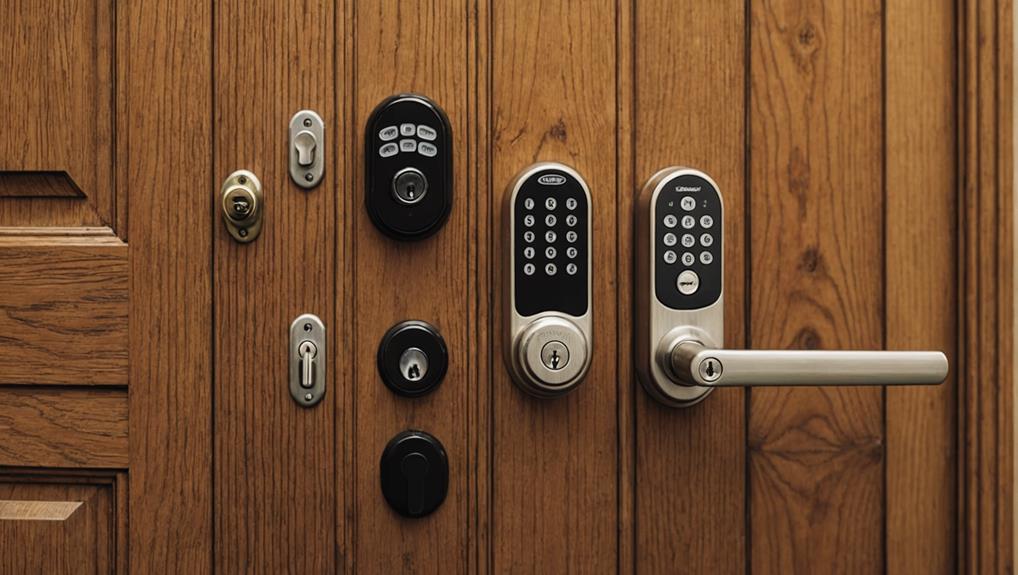
After evaluating the security testing and performance of door locks, it's essential to shift focus to selecting the right lock for your home.
When choosing a lock, consider the types that best fit your security needs. Deadbolts are ideal for exterior doors, while knob locks are suitable for interior use.
Make certain you pick the appropriate grade based on your security requirements: Grade 1 for high security, Grade 2 for moderate security, and Grade 3 for basic applications.
Assess the compatibility of the lock with your door type and material. Evaluate features like smart technology for remote access or keyless entry, balancing convenience and security.
For windows and gates, you might want to select locks specifically designed for various parts of your home.
Don't forget the importance of a heavy-duty strike plate to enhance deadbolt security. Use screws at least three inches long for installation.
Research security ratings, certifications, durability, and finish to make certain long-lasting performance.
Choose wisely to keep your home safe and secure.
Popular Door Lock Brands
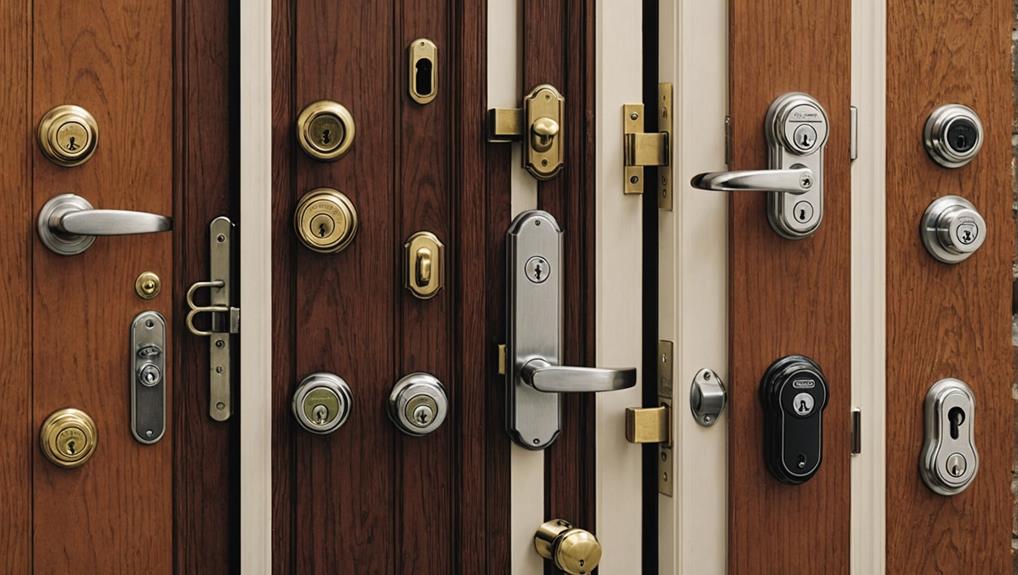
When considering popular door lock brands for your home, it's important to explore options that align with your security needs and preferences.
If you value smart technology, August offers convenient retrofit smart locks with remote access features. For those seeking a blend of style and security, Baldwin provides premium door hardware known for its aesthetic appeal.
Kwikset stands out with its SmartKey technology, allowing easy rekeying and innovative designs to enhance home security. A notable aspect is the comparison between budget and premium locks, which highlights the different levels of security they offer.
Master Lock is a trusted global brand offering reliable and durable locks suitable for residential and commercial use. Professionals often turn to Medeco for high-security locks, thanks to its patented key control systems and superior resistance to unauthorized duplication.
Lock Grades and Ratings
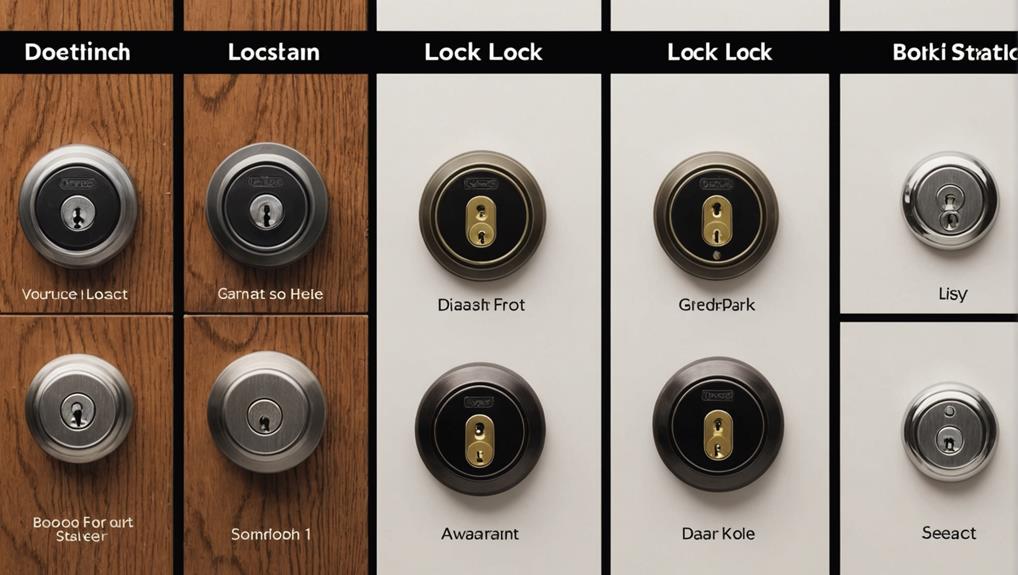
When choosing a lock for your home, understanding lock grades and ratings is essential.
The ANSI grading system classifies locks into three levels based on their durability and resistance to forced entry.
High-security locks often feature advanced technologies such as drill-resistant plates and pick-resistant mechanisms, setting them apart from standard options.
This grading system directly impacts the security level your lock provides, influencing the protection of your home and belongings.
Security Grade Overview
To guarantee the security of your home, understanding the lock grading system is essential.
The ANSI grading system classifies locks into three levels: Grade 1, Grade 2, and Grade 3. Grade 1 locks provide the highest security level and are suitable for high-security residential areas. They're built to resist forced entry with high-quality materials, making them ideal for exterior doors and high-risk locations.
Grade 2 locks offer a good balance between security and cost, making them suitable for most residential applications. On the other hand, Grade 3 locks are less secure and durable, primarily intended for interior doors or low-risk areas, not recommended for entry points.
The security grade of a lock assesses its resistance to forced entry, with higher grades indicating better protection against unauthorized access.
When choosing a lock for your home, consider the ANSI grading system to guarantee the safety of your property and loved ones.
Lock Durability Ratings
Grade 1, Grade 2, and Grade 3 are the classifications used in the ANSI grading system to determine the durability and security level of door locks.
Grade 1 locks are top-tier, offering robust resistance to forced entry, perfect for high-security needs like exterior doors.
Grade 2 locks strike a balance between security and affordability, making them ideal for most residential doors.
However, Grade 3 locks, while suitable for interior doors, provide only basic security and are less durable against forced entry attempts.
Remember, a lock's durability doesn't solely dictate its security level; it also measures its ability to withstand physical attacks and wear over time.
When choosing a lock for your home, consider the ANSI grading system to guarantee you select the right level of security and durability to meet your needs effectively.
Impact on Home
Considering the impact a lock's grade and rating can have on your home security is essential when selecting the right level of protection. The ANSI grading system divides locks into Grade 1, Grade 2, and Grade 3, each representing varying levels of durability and resistance to forced entry. Here's a breakdown to help you make an informed decision:
| Lock Type | Grade | Impact on Home |
|---|---|---|
| Grade 1 | Highest | Ideal for entry doors, offering exceptional security and durability for maximum protection. Consider for smart locks to enhance peace of mind. |
| Grade 2 | Intermediate | A balanced choice for most residential doors, providing good security without the high cost. Offers peace of mind and adequate protection. |
| Grade 3 | Basic | Primarily for interior doors or low-security areas. Not recommended for entry doors due to lower durability and security features. |
Door Lock Fit Considerations
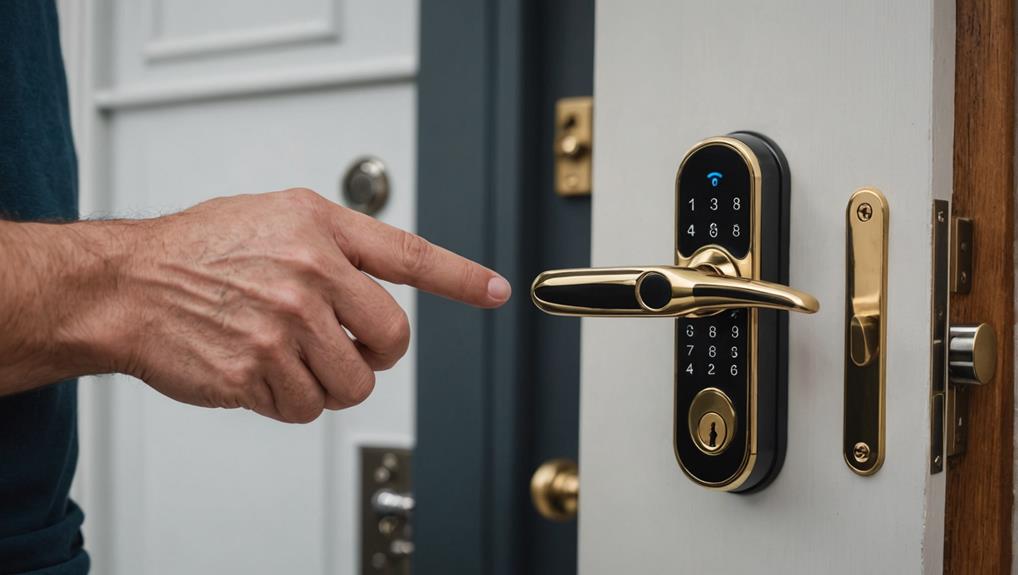
When selecting a lock for your home, it's essential to take into account the fit of the door lock to guarantee proper installation and functionality.
Start by measuring the backset, which should typically be 2-3/8 inches or 2-3/4 inches. Check the cross bore size to verify it matches the lock you plan to install, as most residential locks need a 2-1/8 inch diameter hole.
Consider the thickness of your door; exterior doors are around 1-3/4 inches thick, while interior doors are usually 1-3/8 inches thick. Assess the handing of the door to determine if you need a right-handed or left-handed lock based on the position of the hinges when standing outside.
Additionally, confirm that the lock you choose is compatible with the door material and design for peak performance and security.
For more detailed instructions on this process, consider following a step-by-step guide to installing high-security locks.
Door and Lock Handing
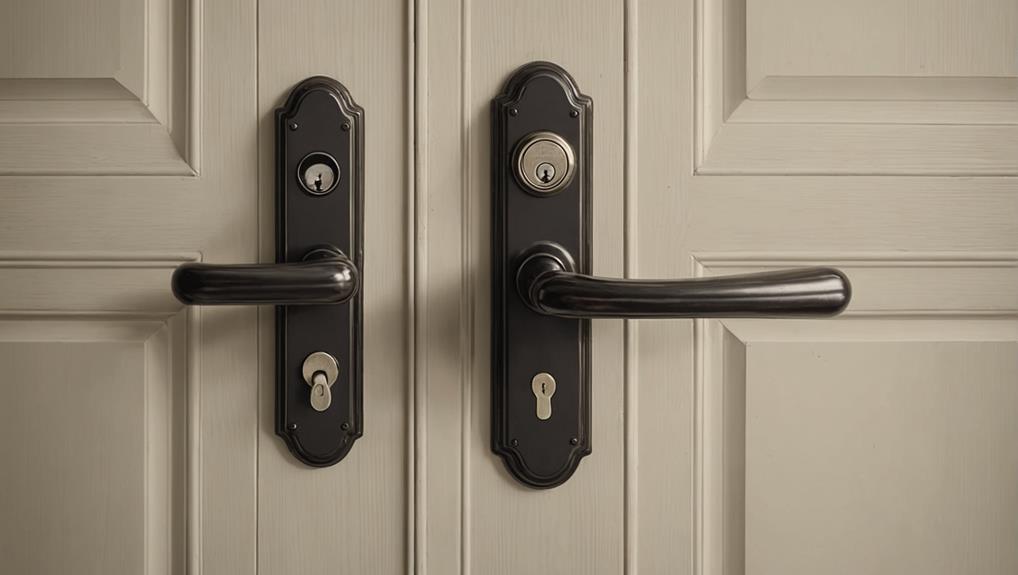
To guarantee the proper functioning and security of your door lock, understanding the concept of door handing is fundamental. Door handing determines whether you have a right-handed or left-handed door, which is significant for selecting the correct lock. Check the hinges' position when standing outside to identify the door's handing – hinges on the right mean it's right-handed, while hinges on the left indicate a left-handed door. Matching the lock handing to your door is essential for effective function and security. Some locks offer reversible options, suitable for both right-handed and left-handed doors, providing flexibility. Ensuring the proper match between the lock handing and your door enhances smooth operation and security, as misaligned locks may lead to inefficiencies. Here's a handy table to help you determine the right lock handing for your door:
| Right-Handed Door | Left-Handed Door |
|---|---|
| Right-Handed Lock | Left-Handed Lock |
| Left-Side Hinges | Right-Side Hinges |
| Opens to the Right | Opens to the Left |
Benefits of a Single Key
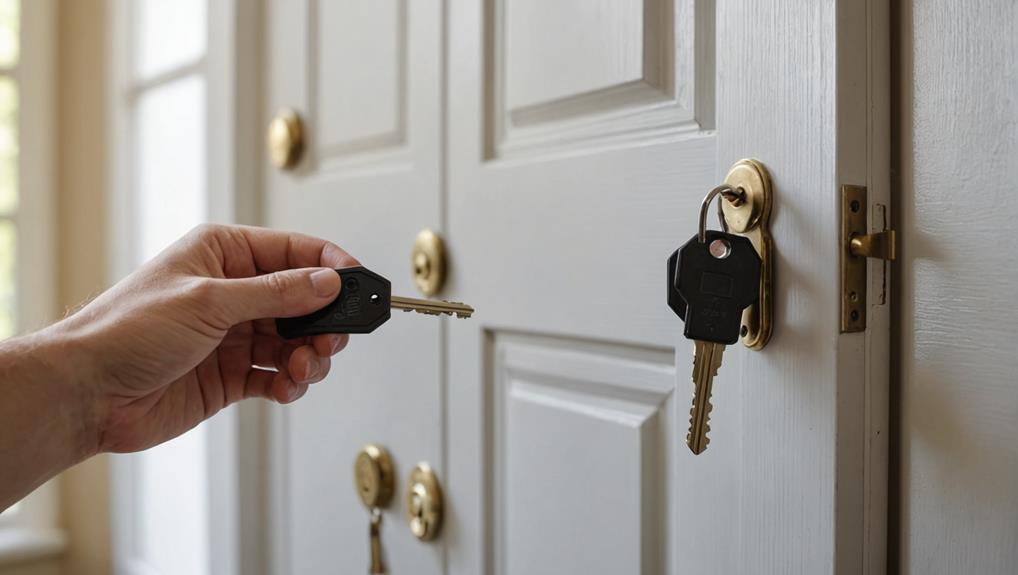
Having a single key for all your exterior doors brings you convenience by simplifying your key management and reducing the clutter in your pockets.
Beyond the ease of use, opting for high-security locks that offer key alike options can further enhance the safety of your home.
High-security locks incorporate advanced materials and design features that deter unauthorized access, making them a superior choice over standard locks.
Key alike options from various manufacturers allow you to streamline access to your home, making it easier for you to navigate your way inside.
In case of emergencies, a single key system saves you time and eliminates the need to fumble with different keys to gain quick access.
Keying Convenience
How can simplifying your key situation make your daily life easier and more secure? Having a single key for all your exterior doors offers a range of benefits that can greatly improve your home security and daily routine. Consider the following:
- Convenience: Reduce the number of keys you need to carry and simplify access to your home.
- Same Key Alike: Opt for a "same key alike" number to have multiple locks operate with a single key.
- Rekeying Technology: Enjoy the ease of changing key configurations without requiring a locksmith with modern locks equipped with self-rekeying technology.
- Standardization of Keys: Enhance security by minimizing the chances of losing keys or having duplicates made through key standardization.
- Peace of Mind: Identify which key operates which door easily, streamlining access and boosting your peace of mind throughout the day.
Key Alike Numbers
Frequently, simplifying your key situation by utilizing a single key for all your exterior doors can greatly enhance both convenience and security in your daily life.
Look for locks with a "same key alike" number, indicating compatibility for keying multiple locks to operate with one key. Home improvement stores offer services where associates can key all locks to work with the same key, streamlining access to your home.
This not only eliminates the hassle of carrying multiple keys but also reduces the risk of losing them. Additionally, modern locks with self-rekeying technology allow you to easily reconfigure the lock to work with a single key without the need for a locksmith.
By minimizing the number of keys in circulation, utilizing a single key system not only simplifies access but also enhances the security of your home.
Consider this option for a more convenient and secure living environment.
Self-rekeying Technology
Maximizing both convenience and security in your home can be achieved through the innovative technology of self-rekeying locks.
With self-rekeying technology, homeowners can effortlessly change their locks' configurations without the need for a locksmith, saving time and money.
Here are some reasons why self-rekeying technology is beneficial for you:
- Easily change lock configurations without a locksmith
- Use a single key for multiple locks, enhancing convenience
- Rekey locks in minutes for lost keys or changing tenants
- Retain the strength of traditional deadbolts with added flexibility
- SmartKey technology allows for key changes without removing locks
These features make self-rekeying locks a user-friendly option for homeowners seeking both security and convenience.
Appearance and Functionality
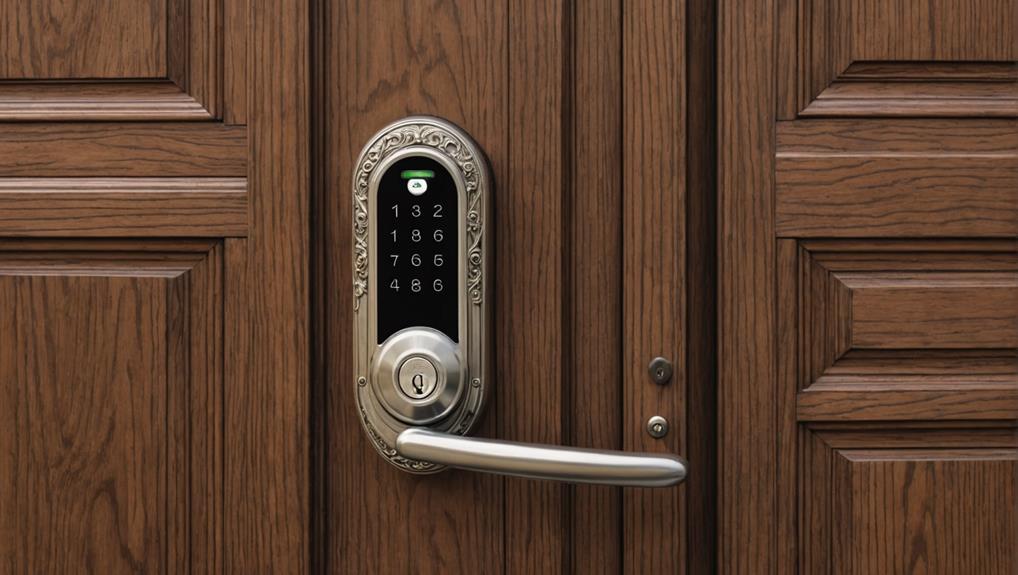
When selecting a lock for your home, it's essential to contemplate not only its security features but also its appearance and functionality. The appearance of door locks plays a significant role in your home's curb appeal.
Choose locks with aesthetic designs and durable finishes like brass, satin nickel, or matte black to match your home's style seamlessly. Modern smart locks offer advanced security features while blending discreetly with your home decor.
These high-security locks are vital for protecting residential properties from break-ins. Consider entry handlesets that combine practicality and style, providing convenience without compromising aesthetics.
Opt for high-quality locks with durable finishes that resist scratches and humidity to guarantee long-lasting appearance. By prioritizing both security and appearance, you can enhance your home's overall look and functionality.
Make a statement with your lock choice while making sure your home remains safe and stylish.
Frequently Asked Questions
How to Choose Door Locks for Your New Home?
To choose door locks for your new home, consider the types available, security ratings, and door specifications.
Assess options like deadbolts and smart locks, prioritize Grade 1 for top security, and measure door dimensions for compatibility.
Look for features like pick resistance and bump-proof designs.
Balance security with style and functionality by selecting locks that match your home's aesthetics and offer convenient features such as keyless entry.
How Do I Know What Door Lock to Buy?
To know what door lock to buy, consider your door type, security grade, handing, need for smart features, and compatibility with door dimensions.
Evaluate if you need a Grade 1 deadbolt for high security or a Grade 2 for residential use.
Check the door's handing to pick the right lock configuration.
Decide on smart features like keyless entry based on your preferences.
Verify the lock fits your door's dimensions and complements your home's design.
How Do I Choose the Best Lock?
To choose the best lock, consider the level of security needed and check the ANSI grading for quality.
Confirm compatibility with your door type and thickness, and look for extra features like pick resistance and bump-proof designs.
Factor in your budget and aesthetic preferences when making your decision.
Remember that a good lock not only provides security but can also potentially reduce insurance costs in the long run.
What Are the Best Locks to Keep Burglars Out of Your House?
To keep burglars out of your house, opt for Grade 1 deadbolts with heavy-duty strike plates and long screws for added security.
Consider smart locks for remote access and monitoring.
Look for locks with pick-resistant and bump-proof features like mushroom pins or pick shields.
Retrofit smart locks can upgrade existing deadbolts without changing keys.
Prioritize security without compromising convenience by choosing the right locks for your home.
Conclusion
Overall, when choosing the right lock for your home, it's important to evaluate the latest door lock technologies, different types of locks, security testing and performance, popular brands, fit considerations, and appearance and functionality. By taking all of these factors into account, you can guarantee that your home is secure and protected. Remember, the right lock can provide peace of mind and added security for you and your family.

